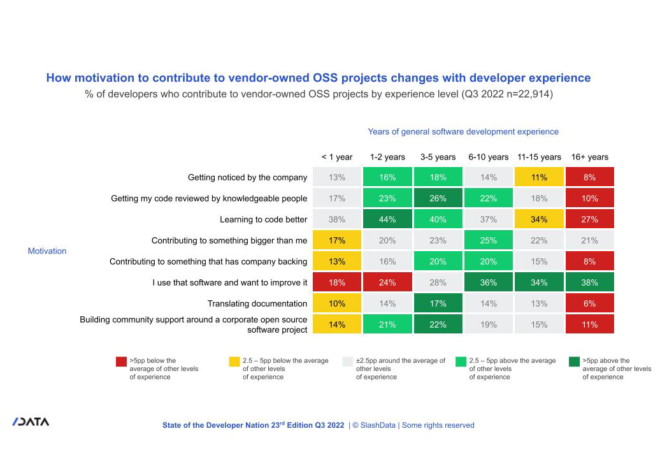
December 23, 2022
Open source software (OSS) development is deeply ingrained in the developer culture, representing a distinct and inclusive collaborative ecosystem. In this chapter, we will explore the motivations behind vendor-owned OSS contributions through the lenses of experience, global region, and the use of Stack Overflow.
OSS projects represent the power of community: collaborative efforts to develop code and software which positively impacts a wider audience than the individuals involved. Vendor-owned OSSprojects, e.g. TensorFlow and Visual Studio Code, combine this sense of community with financial backing from the world’s largest tech companies – a powerful combination of stability and open cooperation.
For every developer involved in vendor-owned OSS, there is a different motivating factor – why do developers contribute to these projects? The big picture is that the top-three motivators for vendor-owned OSS contributors are: wanting to learn how to code better (38%), to improve the software that they use (29%),and to contribute to something bigger than themselves (22%).
How does experience affect vendor-owned OSS contribution?
When compared to beginners, those with six years of experience or more are around 13 percentage points more likely to contribute in order to improve a software they use. These experienced and improvement-focussed developers are also much more likely to hold specialist roles compared to their less experienced peers. For example, they are six times more likely tobe software architects and five times more likely to be either tech/engineering team leads or site reliability engineers. They not only believe that the software they use can be improved, but that they also have the capability and skills to improve it.
Experienced developers devote significant attention to enhancing the open-source software (OSS) provided by vendors, which they actively use and rely on
In fact, improving software seems to be the main motivation for many senior developers – those with 16 years of experience or more are the least likely to contribute for the majority of the other reasons we list. Learning to code better, getting noticed by their company, and getting their code reviewed are much lower priorities among seasoned developers. This is to be expected given the amount of expertise and recognition they have typically accumulated by that stage of their career.
At the other end of the scale, those most willing to contribute for their own education are developers with 1-2 years of experience. Compared to those with even less experience,these developers are 58% more likely to be exclusively professionals and 48% less likely to be exclusively students. In other words, at this stage of their careers, they have enough professional know-how and confidence to contribute to vendor-owned OSS software – yet are pursuing further education for their coding skills by giving back to the community.

Vendor-owned OSS contribution around the world
According to our data, 73% of developers contribute to vendor-owned OSS globally, but the level of contribution varies around the world. Developers in South Asia are the most likely to contribute (85%), while those in Eastern Europe are the least likely (67%). As for the two largest regional developer communities, North America and Western Europe,78% and 70% of developers contribute to corporate OSS projects, respectively.
South Asia and the Middle East and Africa are hotspots for developers contributing to vendor – owned OSS projects in order to level up their coding skills
As for specific motivations, there are a couple of hotspot regions that stand out from the crowd. Nearly half (47%) of OSS contributors in the Middle East and Africa and SouthAsia are motivated by learning to code better and similarly, about one in four by the opportunity to have their code reviewed by more experienced colleagues: 10 and 5 percentage points above the global average, respectively.
Tying in with our previous analysis: these regions also hold the two largest shares of developers with less than two years of experience – 52% for the Middle East and Africa and 73% for South Asia.
However, to see how motivations towards vendor-owned OSS change across the globe, we take a wider perspective. In doing so, we group motivations into three broad categories: individual-focussed (getting noticed by the company, learning to code better, etc), collaboration-focussed (getting their code reviewed by knowledgeable people, etc.), and business-focussed (building community support around a corporate open source software project). In this manner, we can get a view of how sentiments towards vendor-owned OSS change around the world.
For instance, we see that developers in Oceania are at least 5 percentage points more likely than any other region to have business-focussed motivations when contributing to vendor-owned OSS projects. This may be linked to the financial success/focus of developers in this region – 9% of OSS contributors in Oceania report that they or their organisation generate more than $1M of revenue every month on average,compared to the global average of 4%.

Female developers are considerably more likely to be business-focussed when contributing to vendor-owned OSS
An interesting note on gender: we see that globally, female developers are 26% more likely than male developers to be business-focussed in their approach to vendor-owned OSS contribution. This observation is particularly strong in Europe: 54%of female developers in Western and Eastern Europe are business-focussed, compared to 33% of male developers. However, as the proportion of OSS-contributing female developers (22%) is only slightly higher than the global proportion (21%), it’s unlikely that they drive business-focussed regional behaviour.
How do OSS contributors useStack Overflow?
Let’s look at the usage of a website that is synonymous with cooperation in programming and software development and see how the proportion of OSS contributors changes with varying levels of interaction. For users of Stack Overflow, we see a behavioural trend–those who are more active on the website are more likely to contribute to vendor-owned OSS.

Diving into the specific usage patterns of Stack Overflow,those who don’t use or visit the site are the least likely to contribute to vendor-owned OSS for any reason, compared to those who use the site at any level. This is again related to experience: 39% of those who don’t use Stack Overflow havel ess than a year of software development experience and only 5% have an account with a badge; these developers are the least likely to contribute to vendor-owned OSS projects, after those with more than 16 years of experience.
Likewise, there are differences in motivations to contribute to vendor-owned OSS between those with or without StackOverflow badges. For example, only 28% of OSS-contributing developers without a badge want to improve the software they use, in contrast to 40% of developers with badges. A possible driver here is professional status – 74% of those without a badge are professionals. For those with a badge, 91% are professionals: these developers are not only more focussed on improvement, they are more willing to engage with the community to do so.
The strength of community shines through in vendor-owned OSS projects, where collaborative efforts to develop software have the remarkable ability to create positive impacts on a broader audience beyond the individuals directly involved. Here, we’ve shown that developers involved in vendor-owned OSS have different motivations depending on their experience, gender, and region, which in turn reflects how they use collaborative environments like Stack Overflow.
Recent Posts

August 27, 2025
How to Find the Right Learning Path When You’re Switching to a Tech Career
See post

August 27, 2025
The Hidden Challenges in Software Development Projects: Key Insights from Our Latest Survey
See post

August 22, 2025
Developer News This Week: AI Speed Trap, GitHub Copilot Agents, iOS 26 Beta Updates & More (Aug 22, 2025)
See post